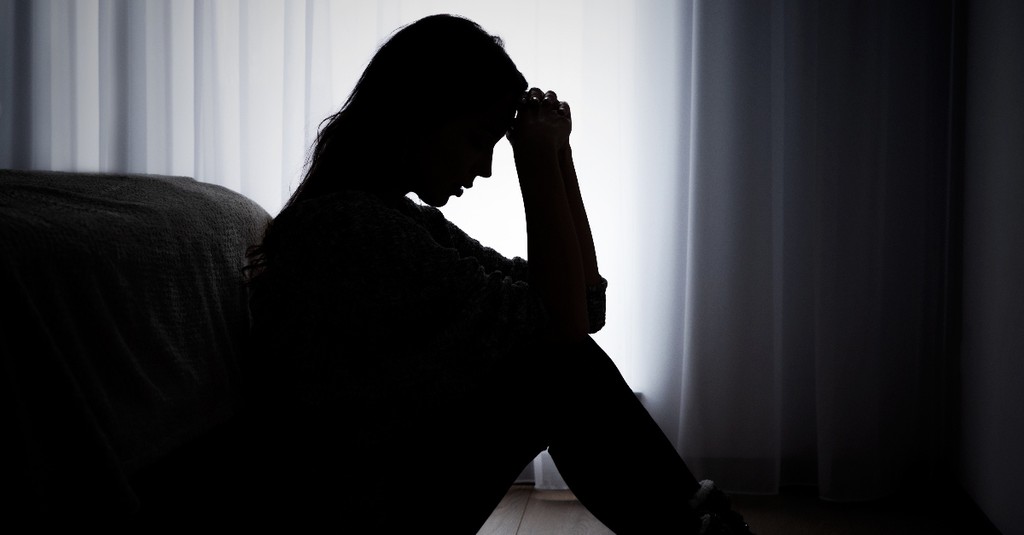
Suicide is something that many Christians avoid talking about. Since it is often viewed as a taboo subject, many Christians are afraid to bring it up. Despite suicide being a taboo subject to many Christians, it is important for the conversation to open up.
As Christians, we cannot pretend that we don't see all the people who are taking their own lives every year. To turn a deaf ear to those struggling is to turn a deaf ear to God's beautiful creation.
Personally, I have struggled with suicidal thoughts since I was a teenager. People are always surprised to hear this when I open up about it because I seemed like an overall happy teenager. This is because mental health doesn't have a "look."
I have found some of the most depressed and suicidal individuals are those who are making others laugh and smile.
Many of the people I have known throughout my life who struggle with thoughts of suicide or suicidal attempts are some of the most outgoing, kind, and caring people I know. Just because they don't look like they are struggling does not mean they aren't.
Even though suicide is a hard topic to discuss, Christians need to start getting their feet wet on this topic. We don't need to run away from the conversation — rather we need to run toward it.
Those who are thinking about suicide or are struggling with suicidal thoughts are the ones who need to hear about Jesus the most.
Even Christian believers who have already placed faith in Jesus need to be reminded of God's love when they are going through difficult times. Believers don't need to be quick to shrug off the needs of others because suicide is not a sin.
Sadly, there are many people who still believe individuals who go through with suicide or think about suicide are sinful or worse than other people. This could not be further from the truth.
A person has to get to a very dark place before they start thinking about suicide, much less going through with their plan.
Those who struggle with thoughts of suicide need our help, compassion, and love. They don't need to be called hurtful names nor do they need you to ignore them. They need your help and Jesus wants you to be there for them.
Here are five things that Christians get wrong about suicide.
Photo Credit: ©iStock/Getty Images Plus/simpson33

1. It Is Not about Getting Attention
One thing Christians get wrong about suicide is that they think it is about attention-seeking. To make things clear, suicide is not about getting attention.
Many people who attempt suicide don't give any signs or warnings. They simply want to go through with the suicide and end the pain.
Something I found helpful when I was experiencing strong suicidal thoughts was talking with my therapist about it.
She asked the question of whether I wanted to actually die or if I just wanted to make the pain stop. This opened my eyes to the fact that I didn't want to die — I just wanted all the pain to stop.
Maybe you have also felt this way when you have struggled with thoughts of suicide. It's not about wanting to die or about getting attention. Rather, it is about wanting all the pain to stop. It is a misnomer to think those who struggle with suicidal thoughts are trying to get attention.
Most of the time when I would open up about my suicidal thoughts to others, they wouldn't understand and they would distance themselves from me.
As one can see, it is not about getting attention. We share our struggles and the desire for suicide because we feel so hopeless about life.
Suicide is not attention-seeking because most people die of suicide if they attempt it multiple times. They are not trying to attract attention in any way. They want others to care about them, but they are not attention-hungry.
People don't get to the point of suicide because they feel cared about and loved. Rather, people get to the point of suicide because everything in their life feels miserable and it feels better to die than to live.
The Christian community does not need to ignore the help that they can give to those who are struggling. A kind word, a voicemail, or a simple coffee get-together could make a world of difference in someone's life.
Try to make the intentional decision to check in on your friends even if you know they don't struggle with suicidal thoughts. It could be that they are struggling in many ways and need some support from a close friend.
Going out of your way to help your friends should not be a chore. Rather, it should be something you want to do because you love them. Go the extra mile and check in on your friends because you never know what they might be going through.
Photo Credit: ©iStock/Getty Images Plus/yourstockbank

2. It Is Not Selfish
A second thing Christians get wrong about suicide is that they think suicide is selfish. Suicide is not selfish in any sense. Many Christians and those outside the church take the ideology that those who attempt suicide are only thinking about themselves.
This is not true because those who attempt suicide think the world would be a better place without them in it. As someone who has been there, I know what it feels like to be on the brink and to think that everyone would be happier without them around.
I must admit that this can be a hard pill to swallow; however, this is what goes through the mind of someone who is considering suicide or tried to attempt suicide in the past.
We think our loved ones would be happier if we were not around because they wouldn't have to be burdened with our presence.
These are all learned behaviors and learned thoughts because nobody is born thinking everyone hates them or that the world would be a better place without them in it.
Rather, these are ideas and thoughts that have been portrayed to them in one way or another by those around them.
These messages could have been conveyed to them by loved ones, teachers, or any person they come in contact with. My feelings of thinking my loved ones would be better off without me started in my teenage years and still continue on into the present day.
I feel like a bother to my family, friends, and coworkers. The thoughts of suicide convince us that if we go through with suicide, it will make everything easier and better for everyone around us. Try to remember this when trying to claim those who attempt or struggle with suicide are selfish.
Photo Credit: ©Getty Images/splendens

3. It Is Not Something You ‘Grow Out Of’
A third thing Christians get wrong about suicide is that they think it is something that the person can "grow out of." Struggling with suicide is not something that a person can grow out of. Just as nobody can outgrow a mental illness, nobody can outgrow struggles with suicide.
Sadly, without proper help, the struggle will become even more severe and there will be a higher likelihood of the person dying as the result of their suicide attempt. This is why Christians need to educate themselves on suicide and stop having false views surrounding this tragedy.
Suicide rates have increased since the pandemic and it is only right for Christians to become more aware of how to help those who are struggling. Don't assume your loved one who struggles with suicidal thoughts will outgrow their struggles. Instead, be there for them and help them.
Remind them that you are always there for them and that you love them. Even if they are in a very dark place mentally, it means a lot to know that you love them even at their worst.
Recently, when I was struggling with thoughts of suicide, a friend told me that they weren't going to leave me because they truly cared for me.
Just this small reminder and these caring words made all the difference to me. It made me feel less alone and reminded me that there were people in the world who still wanted me around. This is key when you are helping someone when they are struggling with suicidal thoughts.
Remind them that they are needed, wanted, and loved. At the moment of their struggles, they are feeling the exact opposite. Remind them of how much you need them, care about them, and love them.
Photo Credit: ©iStock/Getty Images Plus/Tero Vesalainen

4. It Is Not a Hopeless Situation
A fourth thing Christians get wrong about suicide is that they believe it is a hopeless situation. Just because someone struggles with suicidal thoughts does not mean they are in a hopeless situation, nor does it mean they are a lost cause.
They are someone who is in need of your help, and they can get better. Even though they might struggle at times, they can start thinking in a more positive way and fight against the impulse to end their life.
If Christians would stop believing suicide was a hopeless situation, there would be much more support for those who struggle with thoughts of suicide.
Those struggling with suicidal thoughts need to get help. Help can be found in the form of support from loved ones as well as professionals.
If a person has attempted suicide in the past or struggles with suicidal thoughts, they need to talk with a doctor and a therapist. A doctor will be able to help treat any underlying issues, such as depression, PTSD, and anxiety.
In the same way, a therapist will be able to help the individual heal and recover from the wounds that brought them to the place of thinking about or attempting suicide.
There are many people who struggled with suicidal thoughts years ago and now have been attempt-free for over a decade. There is no reason to believe those who struggle with suicidal thoughts are a lost cause.
They are only a lost cause and a hopeless situation if they don't receive the help they need. Everyone deserves help and support. They don't need people saying negative things, such as they are in a hopeless situation because it could become a self-fulfilling prophecy.
Photo Credit: ©iStock/Getty Images Plus/Georgijevic

5. Not Everyone Struggles with Suicidal Thoughts
A fifth thing Christians get wrong about suicide is that they think everyone has struggled with suicidal thoughts at some point in their life. This is not true as not everyone struggles with suicidal thoughts.
Just because someone says "I want to die" after a long workday does not mean they actually want to die. Instead, they are just venting their pain and their desire for some rest.
Those who actually struggle with suicidal thoughts are not as vocal as those who just make the passive comment that they "want to die."
Those who make the passive comment of wanting to die don't truly want to die. However, those who are struggling with actual suicidal ideation will give signs in their actions and behaviors. It is also important to remember that not all individuals will give signs in their actions.
Sometimes suicide can surprise everyone around them, which is why there needs to be open conversation surrounding suicide. When there is an open conversation around suicide, there will be more people who will be able to get the help they need without delay.
Thinking everyone struggles with suicidal thoughts every now and then is to believe a lie as well invalidates the pain of those who have struggled with thoughts about ending their life.
Instead of invalidating their pain, Christians need to stand by their side in their struggles and help remind them of their worth in Christ. Help them remember how they are loved and how God has a plan for their life.
No matter how old a person is, God always has a beautiful plan in mind for their life. Suicide needs to be talked about more within the Christian community because by doing so, many people's lives will be saved each year.
The taboo nature surrounding suicide needs to end among believers. Christians need to correct their false beliefs about suicide and be intentional about helping those who struggle with suicidal thoughts.
For further reading:
5 Things to Remember for National Suicide Prevention Month
How Should Christians Respond to Suicide?
What Does the Bible Say about Suicide?
Photo Credit: ©GettyImages/max-kegfire

Originally published Tuesday, 31 October 2023.
